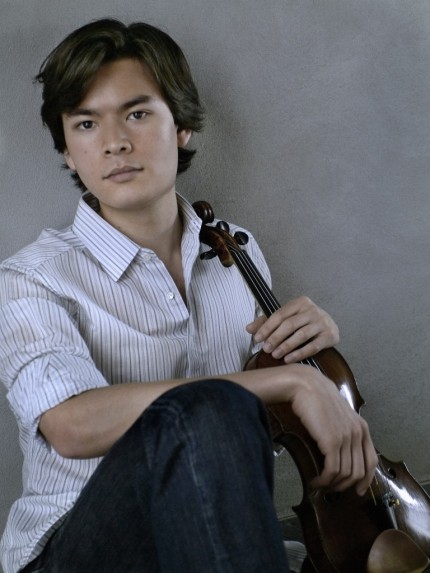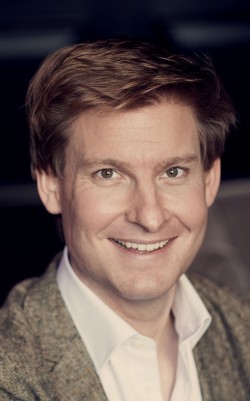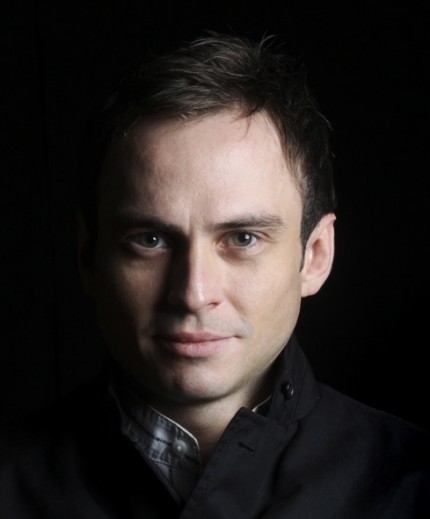Young soloists shine brightly in Beethoven “Triple” play with CSO

It was two years ago that conductor Trevor Pinnock and cellist Pavel Gomziakov both made their Chicago Symphony Orchestra debuts, the latter in a memorable performance of Haydn’s Cello Concerto in C major.
The two men returned to Orchestra Hall Thursday night with a pair of equally gifted colleagues for a performance of Beethoven’s infrequently heard “Triple” Concerto that proved just as rewarding.
Beethoven’s Op. 56 has come in for plenty of bad press over the last two centuries, some of it deserved. While not an outright clinker, the thematic repetition, somewhat banal themes and fitful rum-ti-tum can make for a long evening unless saved by a terrific trio of soloists.
Fortunately, that’s exactly what happened. One can go a lifetime and never hear such an ideally matched and well balanced performance as that served up by Pavel Gomziakov, violinist Stefan Jackiw and pianist Kristian Bezuidenhout Thursday night.

The three young men played with a unanimity and light playful style that perfectly suited this not-too-serious concerto. In his CSO debut, Bezuidenhout provided alert, consistently sparkling keyboard work, displaying seamless ensemble with his colleagues and always keeping the music in scale. Jackiw’s pure, sweet tone and Gomziakov’s dark, burnished cello proved especially simpatico, the two men throwing phrases back and forth, and closely echoing each other’s phrasing and dynamics.

If the Russian cellist’s bristling spontaneity sometimes made for a few pinched notes, his playing also had an infectious jazz-like freedom and abandon that had you hanging on every entrance. Gomziakov floated a gorgeous cello solo in the brief Largo and the Polish theme’s countless iterations in the finale for once didn’t seem interminable with the musicians bringing out the fantasy as well as the wit and rhythmic bite. Pinnock and the CSO provided superb, finely scaled accompaniment, allowing each soloist to shine in the spotlight.
Conductors best known for Baroque or Classical repertoire often seem to produce mixed results in later Romantic music and so it proved with Pinnock in Mendelssohn’s Scottish Symphony (No. 3).
Pinnock’s demonstrative podium style drew a flowing account of the introduction and ensuing Allegro with ample stormy drama and surging momentum. Stephen Williamson’s robust and vivid clarinet solo led off the rambunctious Scherzo delightfully.
And yet for all the dynamism, Pinnock’s fleet tempos sacrificed a certain nobility and expressive ballast in the music. The Adagio, particularly, felt too impatient and generalized, lacking in atmosphere, refinement and dynamic detailing. The finale came across as loud, fast and over-driven with the horn theme at the coda having none of the sense of inevitability required to being Mendelssohn’s symphony to its majestic coda.
The concert began with another take on Scottish music by a non-Scot, Debussy’s Marche ecossaise. Commissioned by an expatriate American of Highland lineage, this “Scottish March” is not one of the French composer’s most timeless pieces, though even in this early work, there are fleeting glimpses of the mature Debussy to come, particularly in the wind writing. Pinnock and the CSO provided a brash and vigorous performance with a notably fine English horn solo by Scott Hostetler.
The program will be repeated 8 p.m. Friday and Saturday and 7:30 p.m. Tuesday. Mozart’s Concerto for Three Pianos will replace the Beethoven Triple Concerto on Saturday and Tuesday. cso.org; 312-294-3000.
Posted in Uncategorized

